The multiple violations of the rights of people with disabilities that the Centre for Legal Resources identified during monitoring visits to the social care home “Sfântul Gabriel cel Viteaz”, Voluntari, Ilfov County, are brought to public attention, where they belong, with the support of journalists Ovidiu Vanghele – Investigative Media Center and Bianca Albu – Buletin de București, in a new investigative piece.
The CRJ monitoring report can be read here: https://bit.ly/3JffuO2.
READ THE FULL ARTICLE on the pages of the Investigative Media Centre and Buletin de București.
Although the Romanian state pays large sums of money every month for the care of people with disabilities, this money does not translate in any way into medical services or activities aimed at ultimately improving their condition or halting their deterioration. In the social care home “Saint Gabriel the Brave”, Voluntari, Ilfov, there are 27 adults with disabilities, cared for by only 4 people.
The conditions in which these people live violate the human rights and the rights of people with disabilities, even though each of them arrived there following the process of deinstitutionalisation that the Romanian state is obliged to go through. The residents of the social care home do not benefit from medical, psychiatric or psychological services except on paper. Most of their time is spent watching TV, either in the unimproved backyard. The two bathrooms on the ground floor are locked; the basement has the isolation room, used as a method of punishment for residents, a small room with a vent-sized opening no wider than a palm; residents have no paper or writing utensils to make complaints or grievances.

In 2012, under pressure from Europe, the Romanian state was forced to remove people with physical and mental disabilities from the nursing homes for which Romania had become world-famous in the early years after the Revolution. Gradually, in a process that began then and is still ongoing, people have ended up in sheltered housing or small social care homes in the community.
This is how a new business emerged and flourished: the trade in very sick, and therefore defenceless, people. At the expense of the state, still obliged to pay good money for their care.
From one of the biggest slices of the budget, that for social assistance, the state has ended up paying large sums for the accommodation, meals and care of each and every disabled person, whether they live with a family or are under care in a state or private social care home.
The more severe the diagnosis, the more the state money increases. It even goes up to one thousand five hundred euros in the most serious cases.
“Social service providers’ have taken the place of nursing homes: NGOs or companies that take in people from the state, but also money, in exchange for accommodation, food and treatment to improve their condition, or at least halt their decline. When the money stays in the pockets of businessmen and doesn’t help people, the social service becomes a money factory.
The circle is simple: the heads of the institutions that “give” people and money to the “social care homes” are also the first to check the conditions in which the sick are cared for. But they don’t.






